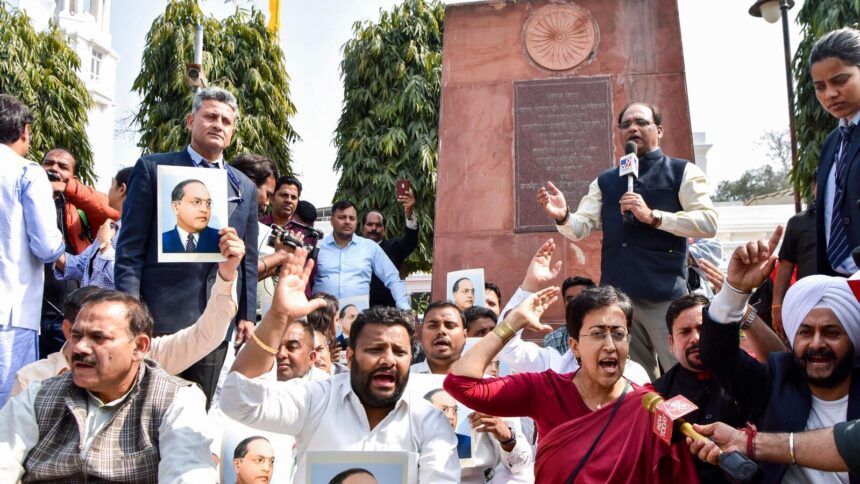Atishi, the Aam Aadmi Party (AAP) leader and Leader of Opposition (LoP) in the Delhi Assembly, stated on Tuesday that the report from the Comptroller and Auditor General (CAG), which was presented in the assembly, has validated the opposition party’s assertion regarding corruption in the liquor trade in the national capital.
The former chief minister has also called for an investigation to be initiated by the Lieutenant Governor of Delhi, as well as by the Central Bureau of Investigation (CBI) and the Enforcement Directorate (ED), based on the findings of the CAG report.
“This report has substantiated our claims. Corruption was evident in the sale of liquor. It reveals that over 28 percent of corrupt activities were linked to contractors, with funds ending up in the hands of brokers. The report indicates that this was occurring openly, and it was common knowledge which party members had been awarded liquor contracts. The contractors profited through incorrect cost price calculations,” Atishi informed the news agency ANI.
Earlier in the day, Delhi Chief Minister Rekha Gupta presented the CAG report titled ‘Performance Audit on Regulation and Supply of Liquor in Delhi’ in the assembly on Tuesday, February 25. This report is among 14 CAG reports regarding the performance of the prior AAP government that the ruling Bharatiya Janata Party (BJP) plans to present in the Delhi assembly.
The comprehensive 208-page report, segmented into eight chapters, outlines deficiencies in the execution of the now-abrogated Delhi excise policy, which ultimately resulted in an estimated loss of ₹2,002 crores to the Delhi government.
“In the eighth chapter, the report asserts that the new policy was designed to be transparent, included mechanisms to curb black marketing, and was expected to enhance revenue. When the same policy was applied in Punjab, there was an increase in excise revenue there. This policy led to a revenue growth of 65 percent from 2021 to 2025,” Atishi remarked.
The CAG report stated that while ordinary citizens suffered the financial burden, Aam Aadmi Party (AAP) leaders profited through ‘kickbacks.’ It also highlights significant lapses, violations of policy, and dubious decisions that favored certain groups while neglecting established procedures.
“The report indicates that if the new policy had been correctly implemented, the revenue could have surged from ₹4,108 crores to ₹8,911 crores within a single year. However, this new policy was not properly executed, leading to a revenue shortfall of ₹2,000 crores,” Atishi explained.
The eight chapters of the report, aside from an introduction, cover topics such as Excise Supply Chain Information Management System, Licensing Issues, Pricing of Indian Made Foreign Liquor (IMFL) and Foreign Liquor (FL), Violations of Quality Standards, Enforcement, and the Excise Policy for 2021-22.
“An investigation should determine who prevented its implementation. Three parties hold responsibility for this: the Delhi LG, CBI, and ED… This policy clearly demonstrates that the AAP government was justified in abolishing the previous policy… We demand that based on this CAG report, an investigation should be initiated by the Lieutenant Governor of Delhi, CBI, and ED, a First Information Report (FIR) should be lodged, and appropriate measures should be taken,” Atishi asserted.










